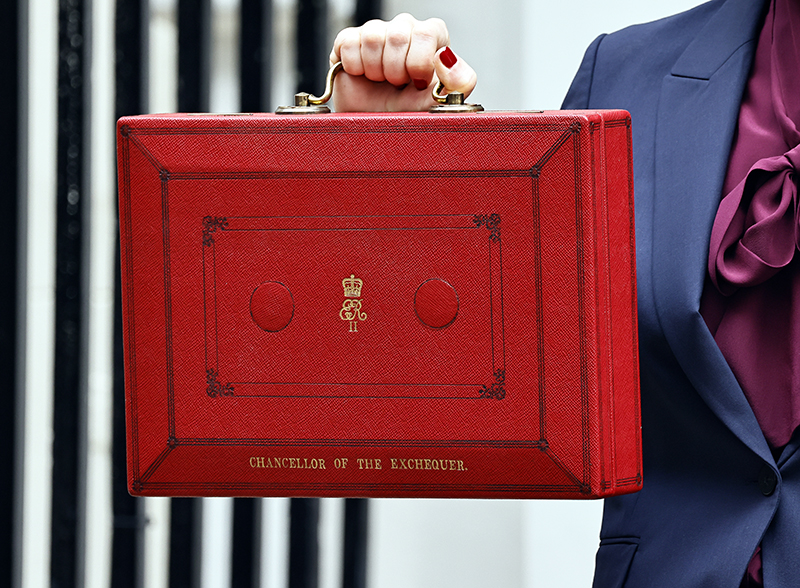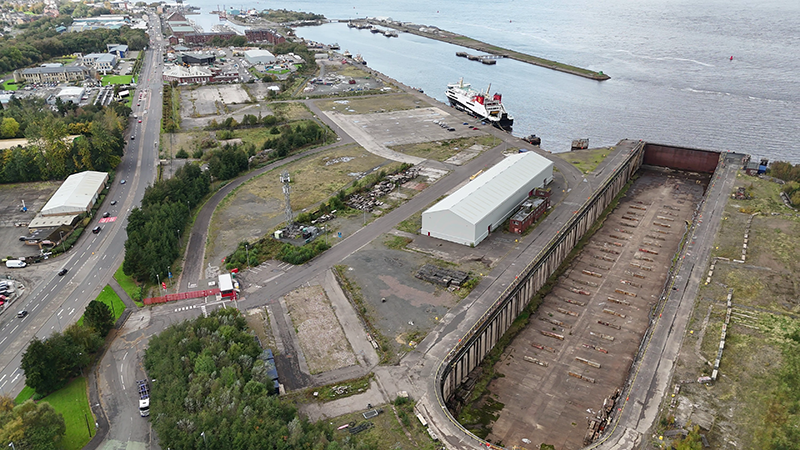
Fife Council welcomed the announcement in the autumn budget statement that Kirkcaldy High Street and seafront will receive £20 million from the Growth Mission Fund.
Councillor David Ross, the council leader, said, “We’re delighted to have confirmation of this funding. This is a significant milestone for Kirkcaldy and for Fife as a whole. As a council, we have long been committed to regenerating Kirkcaldy town centre and the waterfront, and this new funding will accelerate our plans to create a vibrant, inclusive and economically resilient town.
“We’re already progressing key projects, including the demolition of the Esplanade multi-storey car parks and the redevelopment of the former Postings site.”

Along similar lines, the leader of Inverclyde Council welcomed investment of £20 million in Inchgreen Marine Park and historic dry dock. Councillor Stephen McCabe said the financial support announced in the budget statement will help deliver jobs for the area.
Funding has been allocated from the Growth Mission Fund to support the ongoing redevelopment of the site to attract new businesses and create jobs alongside the Ministry of Defence (MoD). As part of the deal, it is proposed that the historic Inchgreen Dry Dock will also become part of the overall Inchgreen Marine Park site.
Inchgreen Marine Park is a joint venture between Inverclyde Council and Clydeport Operations Limited, which is a subsidiary of Peel Ports Group.
Councillor McCabe said, “This is a vote of confidence by the UK Government in not only the potential for Inchgreen Marine Park and the historic dry dock but in the huge potential for Inverclyde as a whole and today’s announcement is very much welcome. We’ve made great strides in recent times to redevelop the site to make it an attractive proposition for a variety of businesses and industries and there is a lot of positive interest in the site.
“This additional investment from the government is a momentous moment in the ongoing redevelopment of Inchgreen and takes us another massive step closer to realising our shared ambition of attracting work and jobs to the site.”

Elsewhere, Richard Meade, chief executive of the SFHA (Scottish Federation of Housing Associations), said that with the UK budget now published, the organisation is looking forward to the Scottish Government confirming its spending priorities and committing to the promised £4.9 billion over four years to support affordable housebuilding in Scotland.
“Given that housing associations will attract significant private financial investment in building new affordable rented homes, the Scottish Government must contribute considerable public investment to make these projects viable,” he added.
David J Alexander, CEO of property specialist DJ Alexander Scotland Ltd, said the budget statement was perhaps not as dramatic as had been expected. He said it was welcome that the banking sector was not hit with a profits levy, which would have affected the mortgage market, and that the housing sector may feel that this budget was ‘not quite as bad as anticipated and could have been much worse’.
He added, “A ‘mansion tax’ is being introduced which will be levied through a ‘high value council tax surcharge’ of £2,500 on properties valued at more than £2m. For properties valued at more than £5m the charge will be £7,500 collected through council tax payments. This was originally intended to be charged on properties valued at £1.5m which would have affected 300,000 owners but the increase in the threshold will reduce those affected to 150,000 or 1% of the total higher value properties in the UK.
“As this will only be levied once property valuations have been undertaken it is anticipated that this will not take effect until April 2028 at the earliest, giving homeowners a useful period in which to decide what they want to do.
“The chancellor said that they ‘will consult on options for support or to defer’ payments until the owner dies or sells their home, which would remove the threat of elderly owners being pressurised to find the annual levy or be forced to sell up. While those impacted will be unhappy that a further tax burden is placed on them, the delay of this being introduced alongside the option for mitigation through appeals and payment deferment mean this is not as drastic as it might have been.”

Julie Palmer, partner at Begbies Traynor, a business recovery, financial advisory, and property services consultancy, said many within the construction and property sectors are likely to be disappointed to see more tax rises and another hike in minimum wage.
“We have seen the large housebuilders, property developers, agents and landlords being able to weather the storm of the past few years, with many seeing growth and record profits despite ongoing challenges. What will be difficult to avoid is the impact on the smaller businesses in their supply chain, and while the impact of the tax increases and minimum wage rises will take longer to filter through, there could be rises in restructuring, refinance or exits in the pipeline.
“For the larger players in the market their main concern must be skills shortages and supply chain disruption from businesses collapsing, now and in the future. Yes, there is an opportunity to sweep up the skilled workforce, assets and project pipeline from these distressed businesses, but any policy decisions that hinder construction output will have wider knock on effects for the property market.”
Professor Andy Angus, economist to the Construction Equipment Association, Cranfield University, said that given the vital role construction will play in driving economic growth, it was surprising how little the sector was mentioned in the chancellor’s speech.
“There was no reference to planning reform and no new commitments on major infrastructure delivery,” he said. “The extension of the income tax and National Insurance threshold freeze means millions more workers will move into higher tax bands as wages rise, reducing disposable income. At the same time, the increase in the National Living Wage raises input costs for firms across the construction supply chain. These pressures come at a time when many contractors and SMEs are already operating on tight margins.
“This must be balanced against increased funding for apprenticeships and skills for young people, and the freeze on fuel duty, which will provide some relief. But with new charges on hybrid and electric vehicles, and no targeted measures to stimulate housebuilding, the challenges facing the sector remain significant.
“While much of the country may feel relieved to have clarity from the budget, the construction sector is still waiting for the long-term signals and certainty needed to support sustained growth.”
Tasos Vezyridis, head of research, UK&I and Continental Europe, at CBRE, said the autumn budget paints a ‘complex’ picture for UK real estate.
“While its contractionary stance may temper growth, it increases the likelihood of a December interest rate cut, which would ease debt costs for the sector and subsequently stimulate more investment activity,” he stated. “The bigger question, however, is how the budget impacts long-term bond yields. If fiscal measures are perceived to fall short, rising bond yields could place further downward pressure on already fragile real estate valuations.
“Tax changes will be felt directly, and increased income tax on earnings from property may tighten rental supply if private landlords exit the residential market. For commercial property, business rate reform remains pivotal, influencing occupier affordability and ultimately investor returns. Meanwhile, there were welcome commitments to regional infrastructure projects as well as recognition of the need to increase capacity within the planning system, so that more projects can be delivered.”
The Federation of Master Builders (FMB) welcomed measures including pulling back on the landfill tax, £48 million to boost planning capacity, and free apprenticeship training for under-25s in SMEs. However, the organisation said the previously announced wage rises will hit small business bottom lines, while a lack of action on domestic retrofit leaves a gap in how the country will upgrade old housing stock.
Brian Berry, chief executive of the FMB, said, “Today’s announcement on landfill tax reform is a big win for small housebuilders, saving them thousands on new build costs. Alongside this, making apprenticeship training for under-25s in SMEs free from paying in the co-investment sum when hiring under 25s will be a boost, alongside much needed simplification of the apprenticeship application process.
“However, the rise in minimum wage will squeeze bottom lines and the freeze in tax thresholds has the potential to push many builders into a higher tax bracket. It’s also disappointing to see the chancellor miss the opportunity to back household energy upgrades of any kind, even rolling back on the ECO scheme. Upgrading homes will be vital to keep people warm in winter and cool in summer. This budget offers welcome steps forward, but overall I can see many builders feeling underwhelmed.”
NFRC (National Federation of Roofing Contractors) warned that the budget could further intensify cost pressures facing SME roofing businesses, as a result of future increases to the National Living Wage and apprentice wages.
From April, the National Living Wage will rise by 4.1% to £12.71 per hour for workers aged 21 and over. The minimum wage for 18–20-year-olds will increase by 8.5% to £10.85, while rates for 16–17-year-olds and apprentices will rise by 6% to £8 per hour.
James Talman, group CEO of NFRC, said, “Our members want to pay fair wages and offer rewarding careers, but this budget has announced more costs for employers at a time when margins are already tight. With NIC increases still being absorbed and the employment rights bill on the horizon, these wage rises will make taking on new staff even more difficult.”
More positively, the budget confirmed that training for under-25 apprentices will be made free for SMEs, which NFRC estimates will save members £550 per apprentice.
Talman added, “Free apprenticeship training for SMEs is a positive and welcome step, and one we have long called for. But it will not, on its own, deliver the workforce growth the country urgently needs. Rising apprentice wages, alongside rising employment taxes and regulatory burdens, mean many firms simply cannot afford to take on more young people, however willing they may be.”








